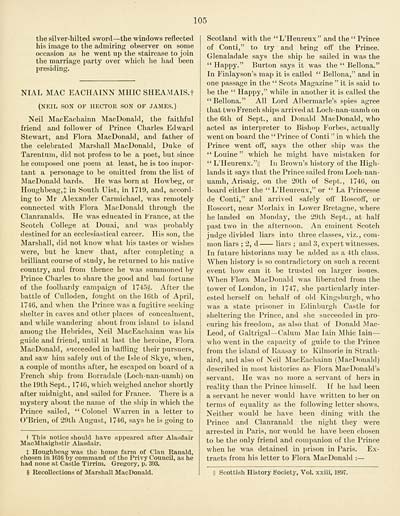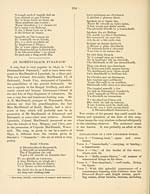Download files
Complete book:
Individual page:
Thumbnail gallery: Grid view | List view

105
the silver-hilted sword — the windows reflected
his image to the admiring observer on some
occasion as he went up the staircase to join
the marriage party over which he had been
presiding.
NIAL MAC EACHAINN MHIC SHEAMAIS.f
(NEIL SON OF HECTOR SON OF JAMES.)
Neil MacEachainn MacDonald, the faithful
friend and follower of Prince Charles Edward
Stewart, and Flora MacDonald, and father of
the celebrated Marshall MacDonald, Duke of
Tarentum, did not profess to be a poet, but since
he composed one poem at least, he is too impor-
tant a personage to be omitted from the list of
MacDonald bards. He was born at Howbeg, or
Houghbeag,J in South Uist, in 1719, and, accord-
ing to Mr Alexander Carmichael, was remotely
connected with Flora MacDonald through the
Clanranalds. He was educated in France, at the
Scotch College at Douai, and was probably
destined for an ecclesiastical career. His son, the
Marshall, did not know what his tastes or wishes
were, but he knew that, after completing a
brilliant course of study, he returned to his native
country, and from thence he was summoned by
Prince Charles to share the good and bad fortune
of the foolhardy campaign of 1745§. After the
battle of CuUoden, fought on the 16th of April,
1746, and when the Prince was a fugitive seeking
shelter in caves and other places of concealment,
and while wandering about from island to island
among the Hebrides, Neil MacEachainn was his
guide and friend, until at last the heroine. Flora
MacDonald, succeeded in baffling their pursuers,
and saw him safely out of the Isle of Skye, when,
a couple of months after, he escaped on board of a
French ship from Borradale (Loch-nan-uamh) on
the 19th Sept., 1746, which weighed anchor shortly
after midnight, and sailed for France. There is a
mystery about the name of the ship in which the
Prince sailed, " Colonel Warren in a letter to
O'Brien, of 29th August, 1746, says he is going to
t Houghbeag was the home farm of Clan Ranald,
chosen in 1616 by command of the Privy Council, as he
had none at Castle Tirrim. Gregory, p. 393.
§ Recollections of Marshall MacDonald.
Scotland with the " L'Heureux" and the " Prince
of Conti," to try and bring off the Prince.
Glenaladale says the ship he sailed in was the
" Happy." Burton says it was the " Bellona."
In Finlayson's map it is called " Bellona," and in
one passage in the " Scots Magazine " it is said to
be the " Happy," while in another it is called the
"Bellona." All Lord Albermarle's spies agree
that two French ships arrived at Loch-nan-uamh on
the 6th of Sept., and Donald MacDonald, who
acted as interpreter to Bishop Forbes, actually
went on board the "Prince of Conti " in which the
Prince went off, says the other ship was the
" Louine " which he might have mistaken for
" L'Heureux. "II In Brown's history of the High-
lands it says that the Prince sailed from Loch-nan-
uamh, Arisaig, on the 20th of Sept., 1746, on
board either the "L'Heureux," or " La Princesse
de Conti," and arrived safely oft" Koscoff, or
Eoscort, near Morlaix in Lower Bretagne, where
he landed on Monday, the 29th Sept. , at half
past two in the afternoon. An eminent Scotch
judge divided liars into three classes, viz., com-
mon liars ; 2, d liars ; and 3, expert witnesses.
In future historians may be added as a 4th class.
When history is so contradictory on such a recent
event how can it be trusted on larger issues.
Wlien Flora MacDonald was liberated from the
tower of London, in 1747, she particularly inter-
ested herself on behalf of old Kingsburgh, who
was a state prisoner in Edinburgh Castle for
sheltering the Prince, and she succeeded in pro-
curing his freedom, as also that of Donald Mac-
Leod, of Galtrigal — Calum Mac Iain Mhic Iain —
who went in the capacity of guide to the Prince
from the island of liaasay to Kilmorie in Strath-
aird, and also of Neil MacEachainn (MacDonald)
described in most histories as Flora MacDonald's
servant. He was no more a servant of hers in
reality than the Prince himself. If he had been
a servant he never would have written to her on
terms of equality as the following letter shows.
Neither would he have been dining with the
Prince and Clanranald the night they were
arrested in Paris, nor would he have been chosen
to be the only friend and companion of the Prince
when he was detained in prison in Paris. Ex-
tracts from his letter to Flora MacDonald : —
II Scottish History Society, Vol. xxiii, 1897.
the silver-hilted sword — the windows reflected
his image to the admiring observer on some
occasion as he went up the staircase to join
the marriage party over which he had been
presiding.
NIAL MAC EACHAINN MHIC SHEAMAIS.f
(NEIL SON OF HECTOR SON OF JAMES.)
Neil MacEachainn MacDonald, the faithful
friend and follower of Prince Charles Edward
Stewart, and Flora MacDonald, and father of
the celebrated Marshall MacDonald, Duke of
Tarentum, did not profess to be a poet, but since
he composed one poem at least, he is too impor-
tant a personage to be omitted from the list of
MacDonald bards. He was born at Howbeg, or
Houghbeag,J in South Uist, in 1719, and, accord-
ing to Mr Alexander Carmichael, was remotely
connected with Flora MacDonald through the
Clanranalds. He was educated in France, at the
Scotch College at Douai, and was probably
destined for an ecclesiastical career. His son, the
Marshall, did not know what his tastes or wishes
were, but he knew that, after completing a
brilliant course of study, he returned to his native
country, and from thence he was summoned by
Prince Charles to share the good and bad fortune
of the foolhardy campaign of 1745§. After the
battle of CuUoden, fought on the 16th of April,
1746, and when the Prince was a fugitive seeking
shelter in caves and other places of concealment,
and while wandering about from island to island
among the Hebrides, Neil MacEachainn was his
guide and friend, until at last the heroine. Flora
MacDonald, succeeded in baffling their pursuers,
and saw him safely out of the Isle of Skye, when,
a couple of months after, he escaped on board of a
French ship from Borradale (Loch-nan-uamh) on
the 19th Sept., 1746, which weighed anchor shortly
after midnight, and sailed for France. There is a
mystery about the name of the ship in which the
Prince sailed, " Colonel Warren in a letter to
O'Brien, of 29th August, 1746, says he is going to
t Houghbeag was the home farm of Clan Ranald,
chosen in 1616 by command of the Privy Council, as he
had none at Castle Tirrim. Gregory, p. 393.
§ Recollections of Marshall MacDonald.
Scotland with the " L'Heureux" and the " Prince
of Conti," to try and bring off the Prince.
Glenaladale says the ship he sailed in was the
" Happy." Burton says it was the " Bellona."
In Finlayson's map it is called " Bellona," and in
one passage in the " Scots Magazine " it is said to
be the " Happy," while in another it is called the
"Bellona." All Lord Albermarle's spies agree
that two French ships arrived at Loch-nan-uamh on
the 6th of Sept., and Donald MacDonald, who
acted as interpreter to Bishop Forbes, actually
went on board the "Prince of Conti " in which the
Prince went off, says the other ship was the
" Louine " which he might have mistaken for
" L'Heureux. "II In Brown's history of the High-
lands it says that the Prince sailed from Loch-nan-
uamh, Arisaig, on the 20th of Sept., 1746, on
board either the "L'Heureux," or " La Princesse
de Conti," and arrived safely oft" Koscoff, or
Eoscort, near Morlaix in Lower Bretagne, where
he landed on Monday, the 29th Sept. , at half
past two in the afternoon. An eminent Scotch
judge divided liars into three classes, viz., com-
mon liars ; 2, d liars ; and 3, expert witnesses.
In future historians may be added as a 4th class.
When history is so contradictory on such a recent
event how can it be trusted on larger issues.
Wlien Flora MacDonald was liberated from the
tower of London, in 1747, she particularly inter-
ested herself on behalf of old Kingsburgh, who
was a state prisoner in Edinburgh Castle for
sheltering the Prince, and she succeeded in pro-
curing his freedom, as also that of Donald Mac-
Leod, of Galtrigal — Calum Mac Iain Mhic Iain —
who went in the capacity of guide to the Prince
from the island of liaasay to Kilmorie in Strath-
aird, and also of Neil MacEachainn (MacDonald)
described in most histories as Flora MacDonald's
servant. He was no more a servant of hers in
reality than the Prince himself. If he had been
a servant he never would have written to her on
terms of equality as the following letter shows.
Neither would he have been dining with the
Prince and Clanranald the night they were
arrested in Paris, nor would he have been chosen
to be the only friend and companion of the Prince
when he was detained in prison in Paris. Ex-
tracts from his letter to Flora MacDonald : —
II Scottish History Society, Vol. xxiii, 1897.
Set display mode to: Large image | Transcription
Images and transcriptions on this page, including medium image downloads, may be used under the Creative Commons Attribution 4.0 International Licence unless otherwise stated. ![]()
| Early Gaelic Book Collections > Ossian Collection > Macdonald bards from mediaeval times > (115) |
|---|
| Permanent URL | https://digital.nls.uk/80461781 |
|---|
| Description | Selected books from the Ossian Collection of 327 volumes, originally assembled by J. Norman Methven of Perth. Different editions and translations of James MacPherson's epic poem 'Ossian', some with a map of the 'Kingdom of Connor'. Also secondary material relating to Ossianic poetry and the Ossian controversy. |
|---|
| Description | Selected items from five 'Special and Named Printed Collections'. Includes books in Gaelic and other Celtic languages, works about the Gaels, their languages, literature, culture and history. |
|---|

